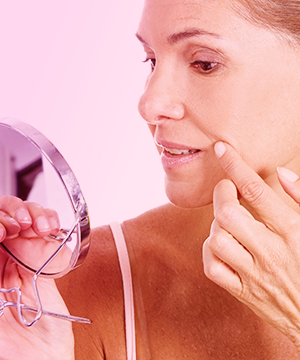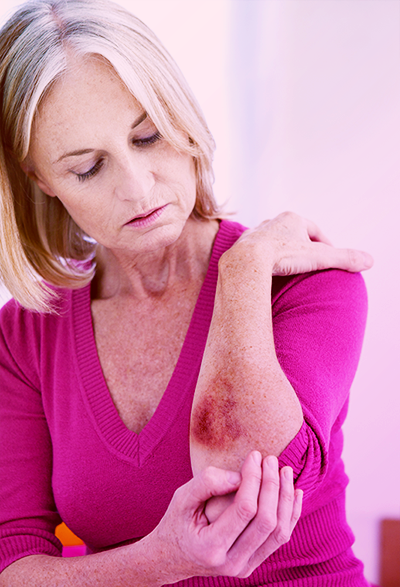
No one’s denying that our skin needs much more attention than it used to. Whether it’s wrinkles, fine lines, or unsightly bruising—there’s always something we want to improve. We asked board-certified dermatologist, Dr. Roger Ceilley, to help us understand how our skin changes over time, and what we can do to keep it looking radiant.
1. Your skin changes on more than one level, not just what you see
on the outside.
“Gravity exerts its force on us every moment of the day, and it can make skin sag as we age. You can see the pull of gravity everywhere, under the arms, buttocks and thighs. The underlying structure of the skin also changes. When we’re younger, the outer layers of the skin,  called the epidermis, are supported by the lower layers, called the dermis, where collagen formation takes place.
called the epidermis, are supported by the lower layers, called the dermis, where collagen formation takes place.
As we age, many factors influence collagen production. Too much unprotected sun exposure over a lifetime, for instance, can weaken the collagen-producing cells and cause fine lines and wrinkles, as well as jowls and a less defined jaw line.”
2. Your everyday habits can affect your skin.
“Protecting yourself from the sun is of utmost importance. UVA rays can be especially harmful to collagen formation. Moisturize immediately after bathing and before bedtime, using creams and lotions containing retinol, ceramides and glycolic acid. Exercising regularly helps blood circulation and the right exercises can help firm up flabby skin.”
3. It doesn’t take much to bruise your skin.

“Bruises form when capillaries under the skin are injured. A brush against the sharp corner of a cabinet can provoke capillary injury. When capillaries break, they release blood pools under the surface of the skin, which eventually get re-absorbed into the bloodstream. While this is taking place, you will see a bruise turn from a bright purple/red/blue to purple/yellow and even green.”
4. Not all bruises are
created equal.
“Depending on age, genetics and certain medications, some bruises will occur more easily and take longer to resolve. It also depends on the extent to which capillaries were broken. Blood thinners, for instance, may make capillaries more fragile and more prone to breaking.”
5. Some areas of the body are more prone
to bruising—be careful!
“The area of the body and the depth of the skin are factors that make one more susceptible to bruising. The skin on the tops of hands and feet, and on the shins, for instance, is thinner and may therefore bruise more easily.”
DerMend® Moisturizing Bruise Formula helps improve the appearance of bruised skin.
Watch the video below to see how DerMend can help keep your skin looking fab.




2 Responses to “5 Things Women Over 50 Should Know About Their Skin”
Reynald Torres says:
As we get older, easy bruising becomes common as the skin becomes thinner and loses protective fatty layer.
Donna says:
I’ve tried this, and it really is a great product!